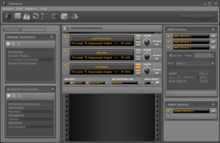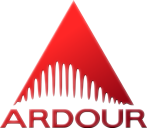
Ardour is a hard disk recorder and digital audio workstation application that runs on Linux, macOS, FreeBSD and Microsoft Windows. Its primary author is Paul Davis, who was also responsible for the JACK Audio Connection Kit. It is intended as a digital audio workstation suitable for professional use.

FL Studio is a digital audio workstation (DAW) developed by the Belgian company Image-Line. It features a graphical user interface with a pattern-based music sequencer. It is available in four different editions for Microsoft Windows and macOS.

Virtual Studio Technology (VST) is an audio plug-in software interface that integrates software synthesizers and effects units into digital audio workstations. VST and similar technologies use digital signal processing to simulate traditional recording studio hardware in software. Thousands of plugins exist, both commercial and freeware, and many audio applications support VST under license from its creator, Steinberg.

Rosegarden is a free software digital audio workstation program developed for Linux with ALSA, JACK and Qt4. It acts as an audio and MIDI sequencer, scorewriter and musical composition and editing tool. It is intended to be a free and alternative to such applications as Cubase.

Renoise is a digital audio workstation (DAW) based upon the heritage and development of tracker software. Its primary use is the composition of music using sound samples, soft synths, and effects plug-ins. It is also able to interface with MIDI and OSC equipment. The main difference between Renoise and other music software is the characteristic vertical timeline sequencer used by tracking software.

Konsole is a free and open-source terminal emulator graphical application which is part of KDE Applications and ships with the KDE desktop environment. Konsole was originally written by Lars Doelle. It ls licensed under the GPL-2.0-or-later and the GNU Free Documentation License.

Scanner Access Now Easy (SANE) is an open-source application programming interface (API) that provides standardized access to any raster image scanner hardware. The SANE API is public domain. It is commonly used on Linux.
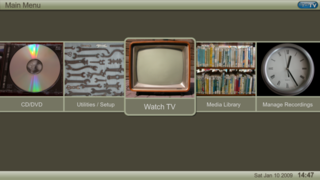
MythTV is a free and open-source home entertainment application with a simplified "10-foot user interface" design for the living room TV. It turns a computer with the necessary hardware into a network streaming digital video recorder, a digital multimedia home entertainment system, or home theater personal computer. It can be considered a free and open-source alternative to TiVo or Windows Media Center. It runs on various operating systems, primarily Linux, macOS, and FreeBSD.
Ecasound is a hard-disk recording and audio processing tool for Unix-like computer operating systems including Linux, Mac OS X, and FreeBSD.

LiVES (LiVES Editing System) is a free and open-source video editing software and VJ tool, released under the GNU General Public License version 3 or later. There are binary versions available for most popular Linux distributions (including Debian, Ubuntu, Fedora, Suse, Gentoo, Slackware, Arch Linux, Mandriva and Mageia). There are also ports for BSD, and it will run under Solaris and IRIX. It has been compiled under OS X Leopard, but not thoroughly tested on that platform. In early 2019, a version for Microsoft Windows was announced, with a release slated for in the second half of 2019.
gtkmm is the official C++ interface for the popular GUI library GTK. gtkmm is free software distributed under the GNU Lesser General Public License (LGPL).

LMMS is a digital audio workstation application program. It allows music to be produced by arranging samples, synthesizing sounds, entering notes via computer keyboard or mouse or by playing on a MIDI keyboard, and combining the features of trackers and sequencers. It is free and open source software, written in Qt and released under GPL-2.0-or-later.
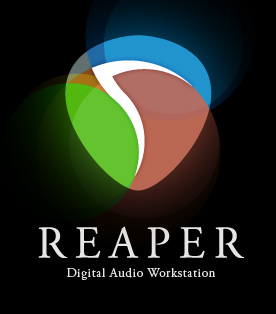
REAPER is a digital audio workstation and MIDI sequencer application created by Cockos. The current version is available for Microsoft Windows and macOS, as well as for Linux. REAPER acts as a host to most industry-standard plug-in formats and can import all commonly used media formats, including video. REAPER and its included plug-ins are available in 32-bit and 64-bit format.

PeaZip is a free and open-source file manager and file archiver for Microsoft Windows, ReactOS, Linux, MacOS and BSD by Giorgio Tani. It supports its native PEA archive format and other mainstream formats, with special focus on handling open formats. Version 9.4.0 supported 234 file extensions.

LV2 is a set of royalty-free open standards for music production plug-ins and matching host applications. It includes support for the synthesis and processing of digital audio and CV, events such as MIDI and OSC, and provides a free alternative to audio plug-in standards such as Virtual Studio Technology (VST) and Audio Units (AU).
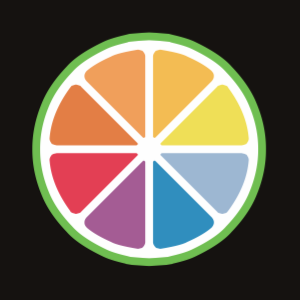
JUCE is an open-source cross-platform C++ application framework, used for the development of desktop and mobile applications. JUCE is used in particular for its GUI and plug-ins libraries. It is dual licensed under the GPLv3 and a commercial license.
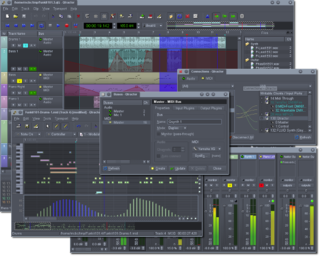
Qtractor is a hard disk recorder and digital audio workstation application for Linux. Qtractor is written in C++ and is based on the Qt framework. Its author is Rui Nuno Capela, who is also responsible for the Qjackctl, Qsynth and Qsampler line of Linux audio software. Qtractor's intention was to provide digital audio workstation software simple enough for the average home user, and yet powerful enough for the professional user.
A software GNSS receiver is a Global Navigation Satellite System (GNSS) receiver that has been designed and implemented using software-defined radio.

mpv is free and open-source media player software based on MPlayer, mplayer2 and FFmpeg. It runs on several operating systems, including Unix-like operating systems and Microsoft Windows, along with having an Android port called mpv-android. It is cross-platform, running on ARM, PowerPC, x86/IA-32, x86-64, and MIPS architecture.
